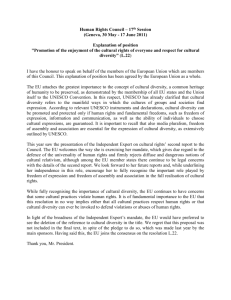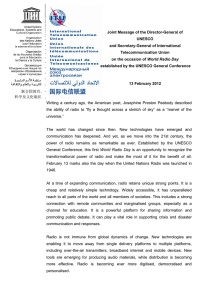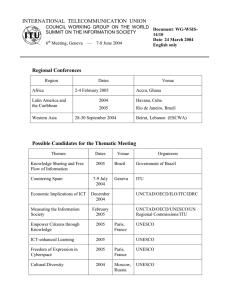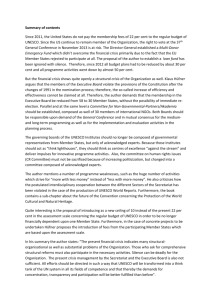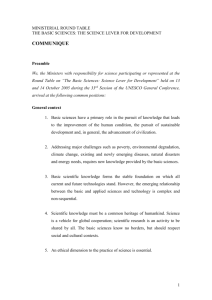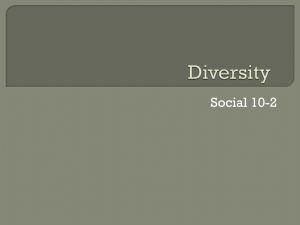I T U D
advertisement
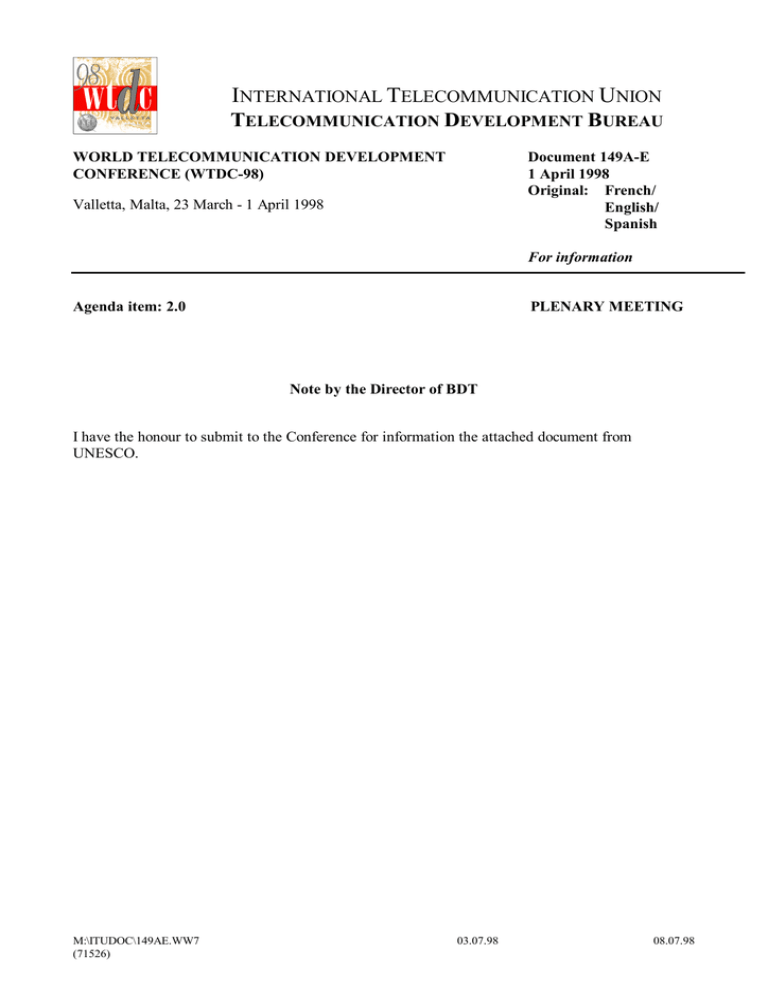
I NTERNATIONAL TELECOMMUNICATION UNION TELECOMMUNICATION DEVELOPMENT BUREAU Document 149A-E 1 April 1998 Original: French/ English/ Spanish WORLD TELECOMMUNICATION DEVELOPMENT CONFERENCE (WTDC-98) Valletta, Malta, 23 March - 1 April 1998 For information Agenda item: 2.0 PLENARY MEETING Note by the Director of BDT I have the honour to submit to the Conference for information the attached document from UNESCO. M:\ITUDOC\149AE.WW7 (71526) 03.07.98 08.07.98 -2CMDT98/149A-E SPEECH OF THE UNESCO REPRESENTATIVE Mr Chairman, Distinguished delegates, UNESCO and an Information Society for All The United Nations Educational, Scientific and Cultural Organisation (UNESCO) is mandated by its 185 Member States inter alia to promote the free flow of ideas by word and image and to foster international cooperation in the fields of communication, information and informatics in order to narrow the existing gap between the developed and the developing countries in these areas. UNESCO's medium-term strategy for 1996-2001 foresees a special focus on the application of communication and information technologies for development, democracy and peace. The dramatic acceleration in the development and use of information and communication technologies during the last few years has set in motion a worldwide process of transition from the "Industrial" to the "Information Society". The depth and non-linearity of this process seems to have much greater social, economic and cultural implications for humanity than the industrial revolution of the past. It is of the utmost importance to understand and to influence the fundamental changes brought about by the "communication and information revolution". The complexity and interrelation of today's world problems defy traditional explanations and solutions and require a completely new approach which must be both comprehensive and interdisciplinary. Moreover, individuals, groups and communities will need to develop not only new tools of analysis but also very different mentalities and attitudes in order to adapt to the emerging "new" civilization based on information and knowledge. Most important of all, there is now a political will in many countries to support and encourage these processes. New legal frameworks and standards are being set up to promote the development and interconnection of national information infrastructures. Well-conceived information highways would further stimulate the already burgeoning national and international markets for information services and products. Today the industrialized countries have an overwhelming lead in all these advances, while for a great number of developing nations even television, telephone or even electricity, are still only a dream. New opportunities for development The economic and commercial opportunities of information highways are certainly significant, but the impact of information technologies on sectors of public concern is perhaps of even greater significance, and is of particular interest and relevance to UNESCO. In the field of education, information technologies, communication and telematics enable interactivity. TV or educational radio, have great potential to reach larger audiences than the traditional classroom process. In the field of environment, information technology will help to expand humanity's capacities to understand and manage physical and ecological processes, and to forecast and respond to disasters and catastrophes. M:\ITUDOC\149AE.WW7 (71526) 03.07.98 08.07.98 -3CMDT98/149A-E In the field of culture, multimedia technologies already offer tremendous possibilities for the promotion and sharing of physical and non-physical cultural heritage. The mass media have already adopted major technological innovations such as electronic editing and generation of images in TV programme production, as well as computerized and communicationassisted publishing of the printed press. Interactive radio, television* and multimedia open up yet unexplored perspectives not only for entertainment, but also for educational and cultural programmes and for the popularization of science, and are likely to enhance the role of public service broadcasting. News agencies are obvious beneficiaries of computer-based technologies which allow more efficient news production and distribution. Even Libraries are certainly destined to play an ever greater role in the access and dissemination of information and knowledge. (Several projects are implemented jointly with ITU: Interactive television for distance learning, telematics etc...) New challenges to society At the centre of the challenge posed by the emerging Information Society is the concept of universal service and how a "right to communicate" will evolve in a digital world where the basic services required by all citizens are becoming more extensive and complex. Access in this context involves not only physical availability and cost (problem of tariffs), but also ensuring that the user can benefit from the services concerned, through a minimum level of "digital literacy" and through appropriately adapted interfaces. In the increasingly competitive and commercial world of information and communication, the risks of exclusion of disadvantaged populations are substantial - both within and among societies. These risks are of particular concern to the developing countries which need clear and resourceful policies if they are to benefit from the emerging communication revolution. The role of UNESCO Under its Constitution, UNESCO is required to contribute to "advancing the mutual knowledge and understanding of peoples, through all means of mass communication", "to promote the free flow of ideas by word and image", to "maintain, increase and diffuse knowledge", and to "give fresh impulse to popular education and to the spread of culture". The strategy is designed to enable UNESCO to play its moral and intellectual role vis-à-vis the emerging Information Society, taking account of the educational, scientific and cultural needs of all nations and individuals and promoting a genuine symbiosis of culture based on mutual respect, tolerance and enrichment. In the bus this morning, there was attached on every seat a slogan: "It's about communication between people, the rest is technology". In those historical sites where so many were taken care of and cured, I hope we will find together the remedies to reduce the gaps. I wish the future cyberspace travellers "Bon voyage". Thank you Mr Chairman. ________________ ____________________ * Some figures: 2 billions of TV sets against 640 millions of telephones. M:\ITUDOC\149AE.WW7 (71526) 03.07.98 08.07.98
